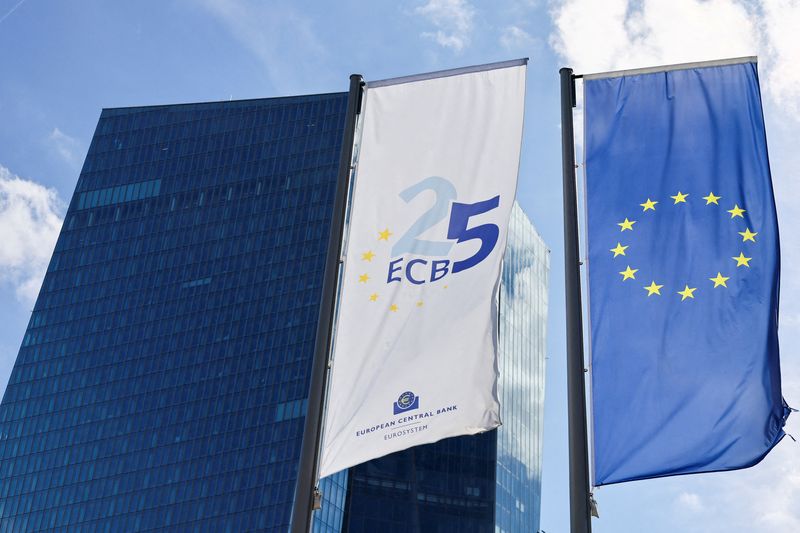By Jonathan Cable
LONDON (Reuters) - The European Central Bank's rate hiking cycle is over, according to all 85 economists polled by Reuters, but it won't be until at least July 2024 before it begins easing as the battle against elevated inflation rattles on.
In September the ECB raised its key interest rates by 25 basis points, taking the deposit rate to 4.00% and the refinancing rate to 4.50%, but signalled its 10th hike in a 14-month-long streak was likely to be its last.
None of the 85 economists polled by Reuters Oct. 12-19 had another lift in their outlook, but the timing of the first cut was more uncertain.
The median forecast and 58% majority view among economists, 48 of 83, showed it would be in the third quarter of next year, or later, and that the deposit rate would be at 3.50% by end-September.
In a snap poll taken after the September meeting, 29 of 70 respondents said the first cut would be in the second quarter of next year, or earlier.
But a little over 40% of respondents in the latest poll, 35 of 83, still said the first easing move would come before ECB Chief Christine Lagarde and the Governing Council meet in July.
"Our model suggests a rate cut may come earlier but we would need to see more subdued data than is currently forecast so I think a cut in September 2024 is quite a balanced view," said Kristian Toedtmann at DekaBank.
A slight majority of economists in a separate Reuters poll see a cut by the U.S. Federal Reserve before mid-2024.
When asked what was the bigger risk to their forecast, 25 economists said that it comes later than they currently expect while 19 said earlier.
"Recent activity and inflation data have been weaker than expected, but this won't stop Christine Lagarde from sticking firmly to the 'higher-for-longer' narrative," noted Jack Allen-Reynolds at Capital Economics.
French central bank Governor Francois Villeroy de Galhau repeated his view last week the ECB should keep its key interest rate at its current level - the highest in its near 25-year history - for as long as necessary.
Inflation in the currency union has been on a downward trajectory but at 4.3% in September was still more than double the 2.0% ECB target.
The downtrend is expected to continue, but the poll concluded it wouldn't be until Q3 2025 at least before inflation reaches target. It was expected to average 5.6% this year, 2.7% in 2024 and 2.1% in 2025.
The price of oil has recently bounced amid fears Israel's military campaign in Gaza following a deadly attack by Palestinian militant group Hamas on Oct. 7 may escalate to a regional conflict.
While the 20-country euro zone will narrowly dodge a recession, the economy was expected to have only flatlined last quarter and will do the same again in the current one as increased borrowing and living costs force consumers to rein in spending.
"At the moment things are turning down so it is very likely all of us will be revising down our forecasts. There really isn't much going for the euro zone right now," said Melanie Debono at Pantheon Macroeconomics.

Germany, Europe's largest economy, likely shrank last quarter and will do so again this quarter and next, easily surpassing the technical definition of recession. Growth in France, the bloc's second-biggest economy, is forecast to be relatively robust.
(For other stories from the Reuters global economic poll: (nL4N3BG3AF))